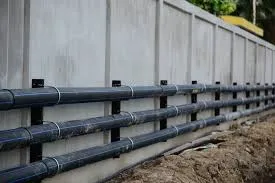11월 . 08, 2024 14:52 Back to list
hdpe poly pipe
Understanding HDPE Poly Pipe A Versatile Solution for Modern Plumbing Needs
High-Density Polyethylene (HDPE) pipe is rapidly gaining traction in various industries due to its outstanding properties, making it an ideal choice for a multitude of applications. With its robust characteristics, HDPE poly pipe has transformed water management, agricultural irrigation, and even industrial processing infrastructure. This article delves into the features, benefits, and applications of HDPE poly pipe, highlighting why it has become a preferred option in today’s plumbing and piping solutions.
What is HDPE?
HDPE stands for High-Density Polyethylene, which is a thermoplastic made from petroleum. The material is known for its high strength-to-density ratio, offering a robust and durable option for various piping needs. The manufacturing process involves polymerizing ethylene in a controlled environment to create a dense, versatile plastic that can be extruded into pipes. The result is a lightweight, yet extremely resilient product that is both corrosion-resistant and flexible.
Advantages of HDPE Poly Pipe
1. Durability One of the most significant advantages of HDPE poly pipe is its durability. HDPE can withstand harsh environmental conditions and is resistant to a wide range of chemicals. This quality makes HDPE pipes suitable for installing in agricultural fields and industrial sites where pipelines may be exposed to various substances.
2. Corrosion Resistance Unlike traditional metal pipes, HDPE does not corrode or rust when exposed to moisture or harsh conditions. This property extends the lifespan of the piping system and reduces maintenance costs over time.
3. Flexibility HDPE pipes have excellent flexibility, allowing them to bend and adapt to various landscaping and installation requirements without compromising their integrity. This quality is particularly beneficial in applications involving uneven terrains or tight spaces.
4. Lightweight HDPE pipes are considerably lighter than traditional piping materials like metal or concrete. This characteristic makes transportation, handling, and installation easier and more cost-effective, as it requires less labor and reduces transportation fees.
5. Leak-Free Joins When installed correctly, HDPE pipes can be joined using heat fusion techniques that create a joint stronger than the pipe itself. This feature significantly reduces the risk of leaks and enhances the reliability of the piping system.
hdpe poly pipe

Applications of HDPE Poly Pipe
HDPE poly pipe is utilized across a variety of sectors, showcasing its versatility
1. Water Supply Systems HDPE pipes are widely used in municipal water supply systems due to their ability to handle high pressure and resist corrosion. The pipes help prevent water contamination, ensuring a safe and reliable supply.
2. Wastewater Management In sewage and wastewater applications, HDPE pipes are preferred for their leak-proof characteristics and resistance to aggressive chemicals. This reliable performance minimizes environmental risks associated with waste leakage.
3. Agricultural Irrigation The agricultural sector benefits immensely from HDPE pipes, especially for drip and sprinkler irrigation systems. Their flexibility and resistance to UV rays ensure a consistent water supply for crops while minimizing water wastage.
4. Natural Gas Distribution HDPE poly pipes are now being used for gas distribution systems. Their ability to withstand high pressure and resist corrosion makes them a suitable choice for safely transporting natural gas.
5. Industrial Uses Industries also employ HDPE pipes in various applications, including chemical transportation, mining, and manufacturing processes, due to their durability and resistance to harsh chemicals.
Conclusion
The rise of HDPE poly pipe signifies a shift towards more durable, efficient, and sustainable solutions in plumbing and piping applications. With its unmatched benefits such as durability, flexibility, and resistance to corrosion, HDPE continues to dominate the market. As industries push for more eco-friendly practices, adopting HDPE poly pipes is not just a trend but a necessity for enhancing infrastructure and protecting our environment. Whether it’s for municipal water systems, agricultural needs, or industrial applications, HDPE poly pipes are proving to be the versatile solution that meets modern plumbing requirements.
-
HDPE Natural Sheet: Durable, Food-Grade & Versatile Plastic Solutions
NewsAug.27,2025
-
Durable Glossy PVC Rigid Sheet | Premium High-Shine Panels
NewsAug.26,2025
-
Durable PP Rigid Sheet: Lightweight, Chemical Resistant Solutions
NewsAug.21,2025
-
PVC Grey Sheet for Extraction: Chemical Resistant & Durable
NewsAug.19,2025
-
Durable PVC Pipe Fittings for Plumbing & Irrigation Needs
NewsAug.18,2025
-
HDPE Steel Belt Reinforced Spiral Corrugated Pipe | High Strength
NewsAug.17,2025

